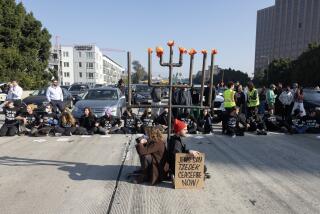Black Workers’ Campaign of Job-Site Protests Gains Broader Backing
- Share via
The demonstrators’ chanted their now-familiar theme--”If we don’t work, nobody works”--and it was scrawled on signs.
As they have done elsewhere since the riots, protesters marched Friday in front of the skeletal frame of a soon-to-be completed shopping center in Gardena, demanding that African-Americans be given jobs in the building and rebuilding of the Los Angeles area.
But the demonstration at Rosecrans Boulevard and Vermont Avenue--headed by Danny Bakewell of the Brotherhood Crusade--gave some indication that the cause is being taken up by a much more diverse group than backed Bakewell’s previous job-site actions.
“This is a moral position we’re taking,” said the Rev. Roy S. Petitt, pastor of the Miracle Center Apostolic Church in the mid-city. “It’s a nonviolent position. It’s time for everybody to speak out for what is right.”
The demonstrators, totaling nearly 100, included a broad mix: ministers, former gang members, representatives of community-based organizations such as the Watts branch of the National Assn. for the Advancement of Colored People and the Black Carpenters Assn., all working under the auspices of the African-American Honor Committee.
Bakewell called the absence of blacks at construction sites in their communities “total insensitivity.” There was at least one black among the handful of workers on the job Friday morning.
“What you see here is hundreds of black people who want to work,” Bakewell told the cheering crowd. “We want jobs.”
Joe Sanders, a graphics artist, heard about the rally from a friend and attended to show support for “my brothers and sisters. . . . It’s an outrage,” Sanders said. “We need jobs.”
As a member of the National Guard, Sanders spent several days during the unrest patrolling Vermont Avenue and Figueroa Street in his old neighborhood. On Friday, he came to guard his community from danger of a different sort--joblessness and economic disenfranchisement.
“I put aside all my plans to be here,” Sanders said. “If the military can send me out to protect the community, I feel I have a moral obligation as a civilian to come out and support a just cause.”
Others, like Derrick Hill, came for more personal reasons.
“I don’t want general relief,” Hill said, holding a sign that read: “No Jobs, No Peace!”
The demonstration ended when contractor George Inouye agreed to talk with members of the Honor Committee in a meeting coordinated by a mediator from the U.S. Justice Department.
During the meeting, held at the Brotherhood Crusade office on Slauson Avenue, Inouye listened as Bakewell--and the demonstrators--listed their concerns. They resolved to continue the protests and go to jail if necessary to ensure jobs for African-Americans.
Initially, Inouye said hiring was left to his subcontractors, adding that he could not force them to alter their hiring practices.
But toward the end of the meeting, the Japanese-American contractor told the group that his experiences over the years have made him sensitive to their concerns. He said he would do what is necessary to increase the number of black workers.
“I’m willing to sit down and do my part,” Inouye said. “You have to understand--being a minority, I’ve been discriminated against. I’ve been denied work because of my race. I know how it feels.”
Bakewell agreed to suspend the demonstrations until Wednesday, when the two sides will meet again.
William Whitcomb, the Justice Department mediator, said he was satisfied with the outcome. “You got the parties together to work out a solution,” he said. “That was accomplished today.”
More to Read
Sign up for Essential California
The most important California stories and recommendations in your inbox every morning.
You may occasionally receive promotional content from the Los Angeles Times.













